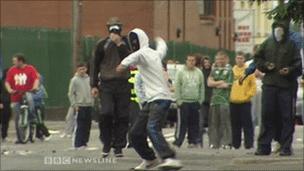The motivations of Lurgan's dissident republican youth
- Published

Lurgan has long been a centre of dissident republican violence
Last Saturday, a no-warning bomb exploded in Lurgan, County Armagh injuring three children, including one aged just two-years-old.
A senior police officer said the attack, almost 12 years to the day since the Omagh bombing, bore "stark similarities" to that atrocity.
Lurgan is one of a handful of areas in Northern Ireland which dissident republicans who were blamed for the bombing can count on some support.
BBC Ireland reporter Andy Martin has spent time in the town in the days following the attack.
"They strongly support the Continuity IRA and any excuse they can get they attack the police and riot, partly out of political conviction, but they would admit, mainly because it is great fun."
Tim Chapman is a former probation officer, who is now a lecturer at the University of Ulster. He has also worked extensively with young people in the Lurgan area and therefore is better placed than most to understand their motivations.
Confrontation
"What would happen to spark it off would be some incident like a hoax bomb which would bring the police into the area and very quickly that would escalate into a confrontation."
Tim says the source of their apparent hatred for the police is manifold but with one thing at its kernel.
"It is political - they are brought up to hate the police as part of the Northern Ireland state. It also symbolises how they see Sinn Fein having sold out republicanism.
"Sinn Fein have made an agreement to support policing and they feel betrayed by that."
That attitude is not only the preserve of those who lived through the Troubles.
Some of those charged over recent trouble in the area have been as young as 13 - born the same year that the Provisional IRA declared its second ceasefire.
"Adults tell them, their parents - these stories are handed down.
"When they take me round their area, they point out many sites where there had been killings and bombs."
Angry
Amidst the rows of council houses, of which Lurgan has many, stands a memorial to three republicans killed in 1991 by those whose loyalty is to the British state.
Tim explains how such an edifice can have an emotional impact on the young people he works with.
"One of the group I worked with was a nephew of one of the victims. He still feels very, very angry and has a great sense of wanting revenge for this.
"He brought me to this memorial and there were other sites that they talked about. These were things that happened before they were born.
"These are 15-year-olds talking about things that happened in the 80s and the early 90s."
Attacks in recent times have not been solely directed at the traditional loyalist enemies.
An increasing number of attempted bombings are on Catholics - those who have bought into the "new dispensation" where both Sinn Fein and the SDLP support the police and encourage nationalists and republicans to join.
For some of these young dissidents though, those Catholics are traitors.
Tim explains: "Their view was that they were the very ones who should be attacked, because they had let down their own side."